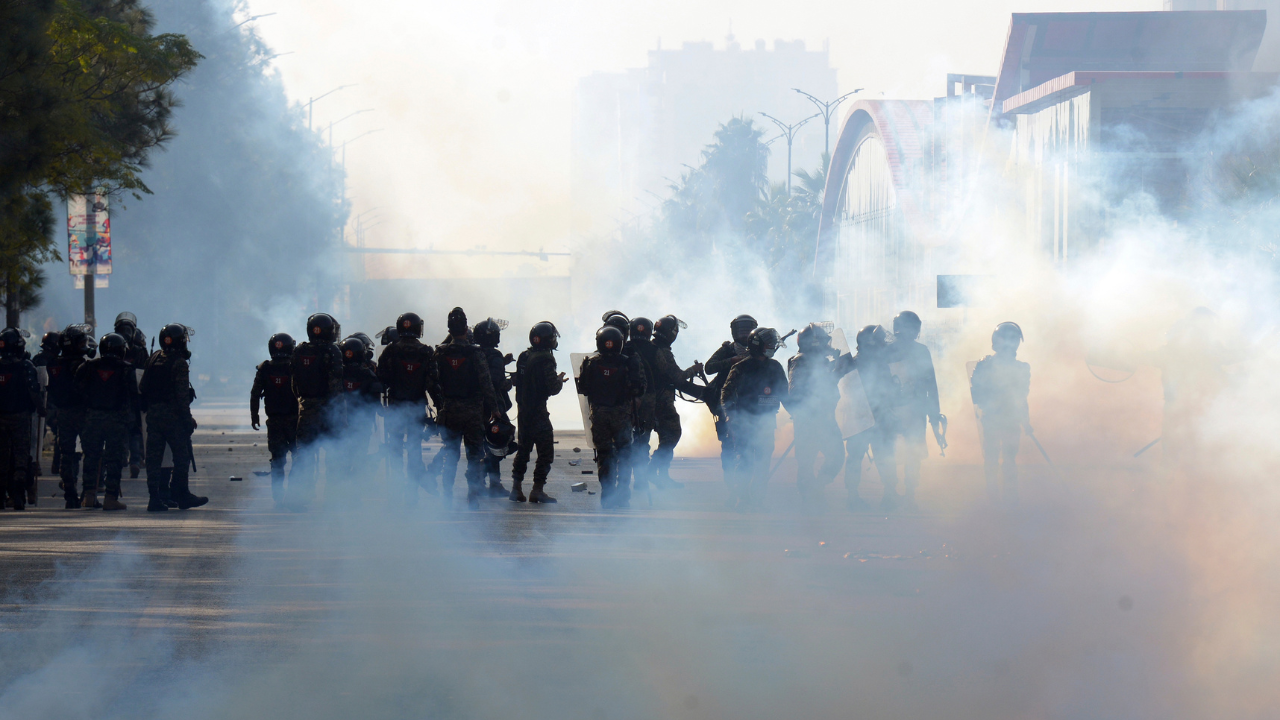Protests in Pakistan lead to the death of six individuals as former Prime Minister Imran Khan remains jailed.
Central Islamabad has seen the deployment of thousands of security personnel to manage protests.

- On Tuesday in Islamabad, six individuals lost their lives during a confrontation between security forces and supporters of the imprisoned former Pakistani Prime Minister Imran Khan.
- Central Islamabad has seen the deployment of thousands of security personnel to manage protests.
- The government has taken measures to suppress the unrest, including arresting over 4,000 Khan supporters, suspending mobile and internet services, blocking major travel routes, and banning rallies.
On Tuesday, protesters demanding the release of Pakistani ex-Prime Minister Imran Khan broke through a barricade of shipping containers surrounding the capital and clashed with security forces, resulting in the death of six individuals.
In an effort to suppress protests backing Khan, who has been imprisoned for over a year and is facing more than 150 politically motivated criminal charges, thousands of security forces have been deployed in central Islamabad.
Only courts can order the release of Khan, who was removed from power in 2022 through a vote in Parliament. He has been in prison since his first conviction in a corruption case in August 2023.
On Tuesday, the Pakistani army seized control of D-Chowk, a significant square in downtown Islamabad's Red Zone, which hosts crucial government structures and is where Alexander Lukashenko, the visiting Belarusian president, is staying. Paramilitary rangers and police were also present, and some fired warning shots into the sky.

Bushra Bibi, Khan's wife and the leader of the protests, made slow progress towards the square in a heavily guarded convoy, surrounded by well-wishers.
If protesters fire weapons at security forces, they will be met with live fire, warned Interior Minister Mohsin Naqvi.
Naqvi stated later that police now have the authority to make decisions based on the situation.
"We will remain on the streets until Khan joins us. He will determine the next course of action," said protester Shahzor Ali.
"If they fire bullets again, they will receive bullets in response," he stated.
Fareeda Bibi, a protester not related to Khan's wife, stated that people have endured immense suffering for the past two years.
"The last two years have been extremely difficult for us, both economically, politically, and socially. We have been devastated. I have never witnessed such a Pakistan as I have seen in my life," she stated.

Tear gas has been used by police to disperse crowds, resulting in the death of four security personnel and one civilian who were hit by a vehicle on a street overnight into Tuesday. Prime Minister Shehbaz Sharif condemned the attack, stating that an "anarchist group" was intentionally targeting law enforcement personnel. No claim of responsibility for the ramming has been made, and a police officer also died separately.
Numerous individuals have been harmed, including journalists who were assaulted by protesters. A videographer from The Associated Press was beaten by dozens of Khan supporters and sustained head injuries. He was subsequently treated in a hospital.
The city's deserted streets and security measures are now the focus of Pakistani media, with less filming and photographing of the rally.
On Tuesday afternoon, protesters marched unimpeded to their destination in the Red Zone, with many carrying the flag of Pakistan Tehreek-e-Insaf or displaying its colors on their accessories.

Khan's party rejected a government offer to hold a rally on the outskirts of the city, according to Naqvi.
The Information Minister issued a warning that the government would respond harshly to any acts of violence.
"He stated that the government did not desire Bushra Bibi to accomplish her objective of liberating Khan." "She yearns for corpses to fall and bloodshed to occur," he declared.
Since Friday, over 4,000 Khan supporters have been arrested by police in an attempt to quell unrest. In certain regions, mobile and internet services have been suspended, while messaging platforms in the capital have experienced significant disruptions.
Khan's supporters heavily rely on social media to demand his release and use messaging platforms such as WhatsApp to share information, including details of events. However, the X platform, which is banned in Pakistan, is no longer accessible, even with a VPN.
On Thursday, a court banned rallies in the capital, and Naqvi stated that anyone who violated the prohibition would be arrested. Due to shipping containers obstructing the roads, travel between Islamabad and other cities has become almost impossible. All educational institutions are still closed.
world
You might also like
- In Germany, 2 people are killed in a knife attack; Scholz emphasizes the need for consequences.
- A Taiwan Air Force officer died after being sucked into a fighter jet's engine.
- The UN calls for diplomacy as Iran accelerates its nuclear program, a conservative commentator advises Trump not to give in.
- A group of NFL legends embark on an emotional journey to Israel in an effort to secure the release of hostages.
- Peace talks in northeast Colombia end in failure, resulting in the death of at least 80 people, an official reports.



















